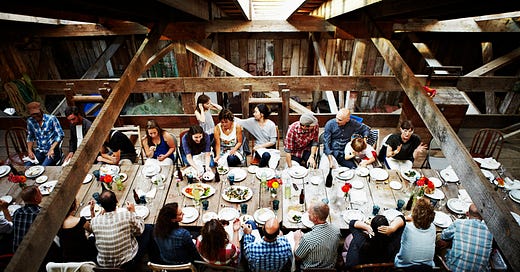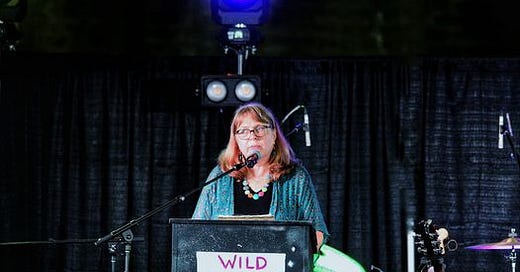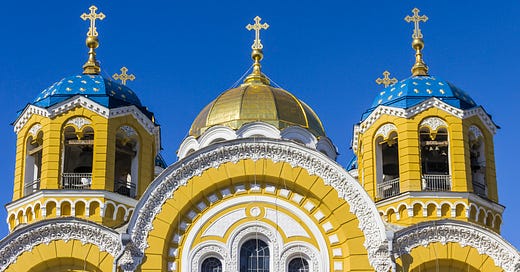

Discover more from The Cottage
Please consider becoming a paid subscriber to The Cottage. This newsletter and the community of conversation that has gathered around it are supported only by readers. There’s no institution behind it, no ads, no list-selling, and no trolls. Just smart, challenging takes and inspiration for your spiritual journey.
Before the pandemic, I was often asked to preach on the Sunday after Easter. The traditional verses for that day are always the same in liturgical churches — John 20:19-31 — the story of Jesus’ first post-resurrection appearance, including the popular account known as “Doubting Thomas.”
One year, as I struggled to come up with a sermon on that perennial text, my attention drifted away from Thomas and back toward the first sentence of the story:
When it was evening on that day, the first day of the week, and the doors of the house where the disciples had met were locked for fear of the Jews, Jesus came and stood among them and said, "Peace be with you."
“The house where the disciples had met” leaped from the page. What house? Of course! The house where, just a few days before they’d had the Passover meal. The house where Jesus had washed their feet and called them his friends. Where they had shared bread and wine — the house of the “upper room.” In the wake of Jesus’ execution and the strange reports from Mary Magdalene of Jesus in the garden, the frightened disciples had gone back to the upper room. Perhaps to grieve, perhaps to remember, perhaps to await what they thought would be their own arrest. But they had gone back to the room with the table, their last gathering place.
Thus, on the night of the resurrection, Jesus showed up there. With his friends. At the scene of the Last Supper. On Easter, Jesus goes from the tomb back to the table.
If you are writing a play about this, the scenes would be table, trial (with its various locations), cross, tomb (burial), tomb (resurrection), and table. The table is the first setting, and it is the final setting of the story. Indeed, when the disciples want to meet Jesus again the next week, they return again to the upper room to meet him at the table.
They never return to the cross. Jesus never takes them back to the site of the execution. He never gathers his followers at Calvary, never points to the blood-stained hill, and never instructs them to meets him there. He never valorizes the events of Friday. He never mentions them. Yes, wounds remain, but how he got them isn’t mentioned. Instead, almost all the post-resurrection appearances — which are joyful and celebratory and conversational — take place at the upper room table or at other tables and meals.
Table - trial - cross - tomb/tomb - table.
What if the table is the point?
Every Holy Week, Christians move toward Good Friday as the most somber — and most significant — day of the year. Depending on your tradition, your may sit in silence, reverence a cross, listen to a sermon, recite the Seven Last Words, fast in quiet prayer. You may weep, sing mournful hymns, feel the weight of injustice. It is sobering business, keeping watch with the execution of an innocent man. For centuries, Christians have been told that everything changed that day, the cross was the bridge between the sinful world and the world of salvation. The cross is all that matters.
Somber, yes. The most somber day. Of course. But what if it isn’t the most significant? What if the most significant day was the day before — the day of foot washing and the supper, the day of conviviality and friendship, the day of Passover and God’s liberation? What if we’ve gotten the week’s emphasis wrong?
Christians mostly think of Maundy Thursday as the run-up to the real show on Friday. And, because the church has placed such emphasis on Friday, we interpret Thursday through the events of the cross. Thus, when Jesus shares bread and wine with his friends, it becomes a prefiguring of his broken body and the shedding of his blood for the forgiveness of sins. We return to the cross all the time. We see Thursday through Friday. From that angle, it becomes morbid. A doomed man’s final meal while the execution clock ticks.
But his friends didn’t experience it that way. They weren’t thinking about a cross or a blood sacrifice. They saw Friday through Thursday. They were celebrating Passover. They were in Jerusalem with friends and family (not just twelve guys at a long table — sorry Leonardo) at a big, busy, bustling holiday meal to commemorate God freeing their ancestors from slavery. Passover is a joyful meal, not a somber one. And, because Passover was about liberation from a hostile oppressor, it was fraught with political expectations and possibilities. Would God free them likewise from Rome? Was the promised kingdom at hand? They were thinking about their history and their future, and they were enjoying the supper together.
Jesus loved meals. They knew that. They’d shared so many. Go back through the gospels and see how many of the stories take place at tables, distributing food, or inviting people to supper. Indeed, some have suggested that Jesus primary work was organizing suppers as a way to embody the coming kingdom of God. Throughout his ministry, Jesus welcomed everyone — to the point of contention with his critics — to the table. Tax collectors, sinners, women, Gentiles, the poor, faithful Jews, and ones less so. Jesus was sloppy with supper invitations. He never thought about who would be seated next to whom. He made the disciples crazy with his lax ideas about dinner parties. All he wanted was for everybody to come, to be at the table, and share food and conversation.
“I think of Jesus,” wrote theologian Beatrice Bruteau, “setting up these Suppers somewhat on the order of the ‘base communities’ of liberation theology.” Gatherings of the Kingdom of God.
Bruteau continues by quoting Rabbi Kushner on Sabbath meals:
And the laughing. The sharing. And the singing. One melody is scarcely spent when another comes forward. We don’t even notice the racket of the children. There is a great holiness in this room. It grows with the sharing. [I take a large ceramic Kiddush cup, fill it with wine, offer it to my wife and then to the man next to me, who] hands it to his wife with the solemn instruction, “Here, keep it going.” And we do. From hand to hand. Drunk from and refilled. Time and time again.
Sabbath. A vision of the kingdom of God. The meal reminds us and continues the promise.
What if Maundy Thursday was that? The Last Supper of the Old World. The last meal under Rome, the last meal under any empire. And it is the First Feast of the Kingdom That Has Come. The first meal of the new age, the world of mutual service, reciprocity, equality, abundance, generosity, and unending thanksgiving. Pass the cup, keep it going, hand to hand, filled and refilled, time after time. This night is the final night of dominion, the end of slavery; and this night is the first night of communion, the beginning of true freedom: “I will no longer call you servants but friends.”
This table is the hinge of history. The table is the point. Thursday is the Last Supper and the First Feast. The Holy Thursday Revolution.
Pull up a chair. Bring a friend.
There will be a post tomorrow on Good Friday. It will be open for all to read and share.
INSPIRATION
empty space
at the dinner table—
a flower without its petals
— Rosemerry Wahtola Trommer
And everything is upside down,
like faces mirrored in a bowl:
an earthen vessel, roughly formed,
that's full of water while the one
who once was robed, incomp'rable,
in light removes his outer robe
to tie a tow'l, a servant's garb,
around his waist and stoops to wash
his foll'wer's feet of traces from
the dusty Roman roads they've walked.
Yes everything is upside down
for whom in all this world would like
to think that him whose praise we sang,
"Hosanna to King David's son,"
should stoop to take a servant's part.
Oh we would rather he should reign
on high with us at his right hand.
But Servant Lord, incomp'rable,
you call us to remove our pride,
an outer robe, and stoop to wash
all others' feet: humility,
and thrust down deep our dusty feet --
to take the love you offer us --
into the bowl reflecting you.
— Br. David Hirt
You welcome us to a table where love is made known.
You welcome us to eat and drink.
You welcome us to eat from the grain of your fields and the fruit of your vines.
You welcome us – disordered and disoriented and disconnected – broken and bitter.
You welcome us, O Holy One.
And so our prayer this day, as we prepare to eat, drink and remember,
is that we in turn might find the courage and the strength and the passion-filled desire to in turn welcome someone;
to in turn extend a glimpse of your radical hospitality,
starting with just one person in order that by your grace and through the nourishment of your table,
we might begin reordering the brokenness, reigniting the extinguished lights,
and bringing a measure of wholeness to a broken and fragmented world.
In our chaos O God, we pray this day that we will listen and hear you speak.
Amen.
— Disciples Peace Fellowship, USA











It has been hard to keep up with all the comments on this reflection! I'm so pleased that it has spoken deeply to so many of you. Thank you for reading - and thank you for being on this Lenten journey with me and the Cottage community. More coming over the next three days!
This, Diana, this! There is indeed a whole sermon here! Wonderful exegesis!